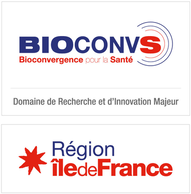test fr
One of the missions of BioConvS is to promote the transition of technologies from the lab bench to the patient’s bedside. To achieve this, we’ve decided to create a set of training and networking opportunities through a « club » called « Innovators of Tomorrow. » Unlike many existing entrepreneur programs, our target is not scientists with existing innovation projects, but rather early-career researchers who are curious and unfamiliar with innovation. It’s an intriguing opportunity for them to step outside the lab and explore whether innovation aligns with their interests. The program will primarily center on synthetic biology, biotherapies, and bioproduction, reflecting the thematic focus of the DIM BioConvS.
You can read all about the program in the slides below.
Amanda Silva Brun introduces the Innovators of Tomorrow programme during the closing remarks of the BioConvS Innovation Day, on November 14th 2023
Background
Île-de-France represents 21% of health activities in France with various players such as research centres, universities, hospital services, small and large companies and investors. The richness of the ecosystem of Île-de-France around synthetic biology and biotherapy/bioproduction lies at the heart of this unifying project to promote scientific unity and a common direction.
Today, and despite the existence of many scientific and economic signals demonstrating the importance of biofoundery for biotechnology, there is no such project in France: that’s why the DIM BioConvergence for Health initiative was established. The structuring objective of the DIM is to create a network of distributed biofounderies (with the participation of Sorbonne University, INRAe, Institut Curie, Genopole and Université Paris Cité) to make technologies for life design and engineering accessible and thus position the Île-de-France Region as a key player in biotechnology, bioproduction and biotherapy. This structuring will involve the acquisition and pooling of high-tech equipment dedicated to the molecular engineering of living systems and bioproduction. This will allow a large community to have access to state-of-the-art tools in synthetic biology, bioproduction tools including bioreactors for scaling up. This will make it possible to create genetic circuits, synthetic cells and bioprocesses ondemand.
Another flagship initiative is the CollectivE Digital Intelligence Platform (DICE), led by UMR 1284 within the Learning Planet Institute and Université Paris Cité, which will be set up with a set of digital resources to design, document and bring together BioConvS research projects in a virtual collaborative research space. This platform, open to the general public, will strengthen the capacity for exchange between DIM’s partners and society.
This structuring will also involve the financing of collaborative projects, theses, engineering and post-doctoral jobs between DIM teams, the organization of workshops and conferences and support for the participation of student teams in the “International Genetically Machine Competition (iGEM)” which moved from Boston (MIT) to Paris in 2022.
Action financée par la Région Île-de-France
Follow us on LinkedIn
Join our LinkedIn group
Contact: contact@bioconvs.org
Consult our data protection policy
Address:
DIM BioConvS
Faculté des Sciences - Université Paris Cité
5 rue Thomas Mann 75013 Paris


